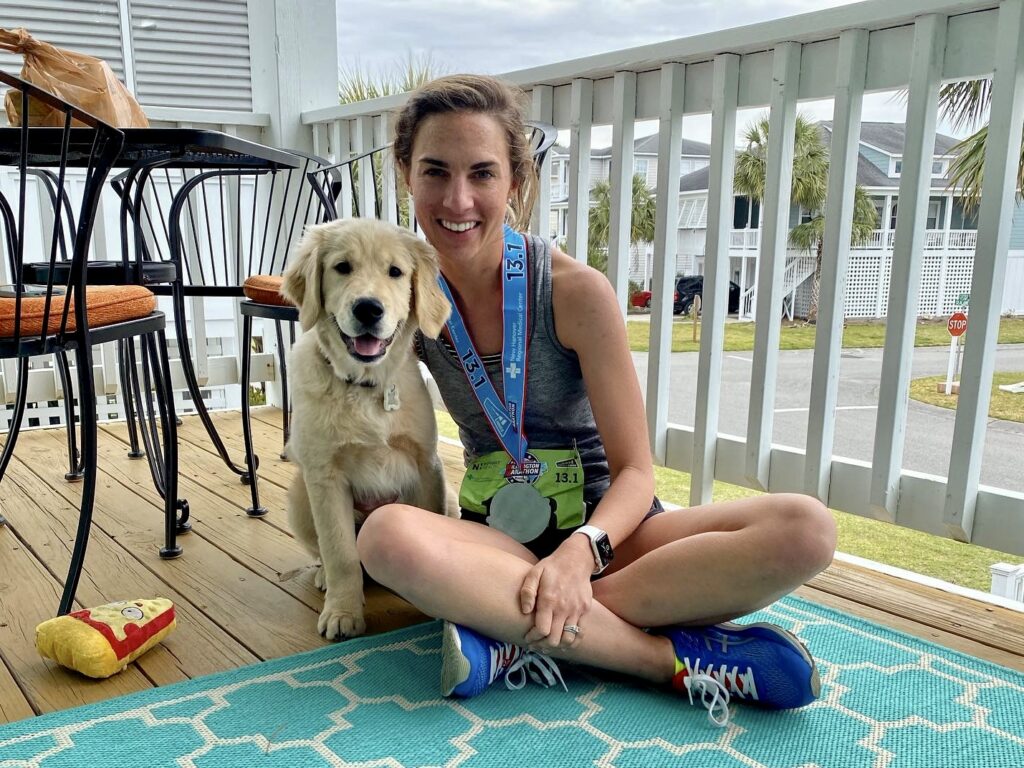Dual degree student Alexa Fagan shares the importance of self-care during PA school

Alexa Fagan (’22 MPAP/MSPH) shares about the importance of movement and self-care during PA school.
When you begin your first week of the didactic year as a Campbell Pharmacy & Health Sciences (CPHS) physician assistant student, the feeling of needing to adjust your schedule is not uncommon. Often, we are quick to sacrifice things in our schedule that may actually serve us in the long run. I want to encourage you to continue to include something you love in your everyday routine. Movement is medicine. We’ve all heard this statement a time or two, and on many occasions, I’m sure you, like me, have chosen to ignore it and tried to come up with something else that might make your day better like enjoying your favorite snack, watching your favorite show, or scrolling mindlessly through social media. While these are all great ways to participate in some self-care, I’ve found movement-a walk with a friend, a run, a HIIT workout, yoga- to be the most refreshing and grounding self care I can partake in.
One of our first lectures of PA school was given by Dr. Jennifer Bunn who spoke about the Exercise Is Medicine initiative. The lecture included a number of important concepts which emphasized the importance of conversations with patients about including physical activity in their daily routine. Currently, the Exercise is Medicine initiative recommends 150 minutes a week of aerobic activity. When we consider all of the other demands of our day-to-day schedules, carving out time for a 30-minute aerobic workout may seem next to impossible, especially in PA school when you feel like you should be studying. How can I afford to give up multiple 30-minute blocks of studying to get in a walk or workout? The better question or statement might actually be, we can’t afford NOT to. Throughout our units, we have learned about the risks of a sedentary lifestyle in many disease states. As future providers, we must understand to practice what we preach. This will not only give value to patient education and counseling conversations, but will improve our own well-being. Dr. Woodis, a pharmacotherapeutics professor, really drove this point home during our cardiology unit. In our conversations with patients about lowering their cholesterol levels or trying to better manage their blood pressure, we have the ability to be much more relatable, and allow these patient education points to be better received if we can speak from experience. As future providers, if we don’t find the time or energy to include movement, healthy meals, and self care in our routines, why would our future patients want to listen to these suggestions?
Our didactic year director, Dr. Ward gave a presentation on our very first day of our PA school orientation which included advice about continuing to participate in outlets and activities which would renew us and allow us to return to content refreshed and ready. Whether my 150 minutes of aerobic exercise per week includes fifteen 10-minute walks or a long run, I feel more engaged, and better prepared to learn when I include this practice in my schedule. I have continued to run and workout, even on days when it might seem like a stretch to get a workout in, because I know I will be sharper and more focused on the other side of the workout, which will allow me to approach the content better. I also have started using my longer runs to listen to podcasts with content that matches our current units. One of my absolute favorite podcasts is the Physician Assistant Exam Review by Brian Wallace. I find that I remember the information even better if I am moving while I listen to it. His podcasts also involve questions at the beginning and end of each episode which allow for some active recall and studying while on my runs. Some of my classmates walk many miles before tests as they study alone or with one another.
While I understand running isn’t everyone’s favorite activity, I do know that any form of movement will leave you in a better place mentally, physically, and emotionally compared to the headspace you were in just prior to that workout. Incorporating a daily 10-minute walk between lectures, while on a phone call, or while listening to a podcast can have a substantial impact on your health, interactions with others, clarity of thought, and focus. I encourage you to include movement and self-care even when it may seem impossible to fit anything else into your schedule. I promise you won’t regret it!
